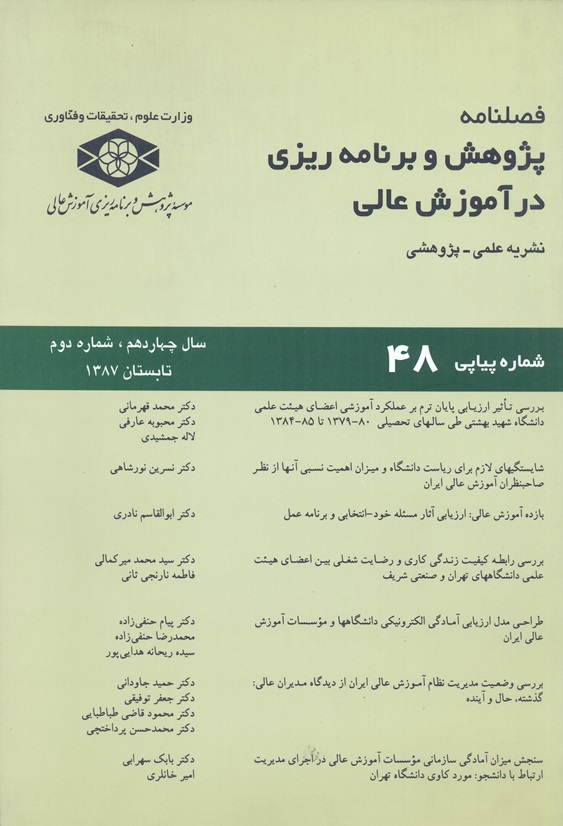بازده آموزش عالی: ارزیابی آثار مسئله خود-انتخابی و برنامهعمل
نویسنده
استادیار دانشکده روانشناسی و علوم تربیتی دانشگاه تهران
چکیده
هدف اصلی مطالعه حاضر تحلیل و ارزشیابی آثار «مسئله خود-انتخابی و برنامهعمل» ناشی از تصمیم گیری افراد برای تحصیل در دانشگاه بر بازده آموزش عالی است. برای این منظور، از مبانی نظری -تحلیلی مسئله خود-انتخابی - یعنی رگرسیون شرطی - و دادههای مستخرج از آمارگیری مرکز آمار از ویژگیهای اقتصادی و اجتماعی خانوار سال 1380 استان تهران استفاده شده است؛ ابتدا آثار مسئله خود - انتخابی بر برآوردهای بازده آموزش عالی شاغلان استان تهران تحلیل و ارزیابی شده و سپس، نتایج به دست آمده با نتایج مربوط به دو نمونه آماری از جامعه آمریکا مورد مقایسه و انطباق قرار گرفته است. نتایج به دستآمده نشان میدهند که: 1. آموزش برای شاغلان استان تهران سرمایهگذاری پُر بازدهی است؛ 2. بازده آموزش عالی به طور چشمگیری بیشتر از بازده آموزشهای دیگر است؛ 3. لحاظ کردن مسئله خود-انتخابی در تحلیلها آثار تجربی برنامه آموزشعالی را متأثر می سازد و آن را به طور چشمگیری افزایش میدهد؛ 4. نتایج نمونه به دست آمده از استان تهران کاملاً منطبق با یافتههای حاصل از نمونههای استفاده شده در جامعه آمریکاست. بدین ترتیب، الگوواره یافتههای همه نمونهها مشابه و مطابق با تحلیلهای نظری است؛ یعنی برآوردهای تجربی بازده آموزش عالی که مسئله خود- انتخابی را نادیده گرفته، تورشدار و ناسازگارند و لذا، سیاستگذاری بر پایه آنها میتواند گمراهکننده باشد و نیز آثار نامطلوب جّدی بر تخصیص منابع در یک جامعه به جا بگذارد.
کلیدواژهها
عنوان مقاله [English]
Returns to Higher Education: An Evaluation of the Effects of Self-Selection Problem & Treatment
نویسنده [English]
- Abolghasem Naderi
Assistant Professor, Department of Educational Planning & Administration Faculty of Psychology & Education Tehran University, Tehran
چکیده [English]
This articles aims at evaluating the effects of self-selection problem and treatment on returns to higher education caused by individuals' decision to attend colleges or universities. We apply conditional earnings functions to tackle the problem of self-selection bias. Using data from the Tehran province survey of socio-economic characteristics 1380 and the U.S. National Longitudinal Survey of Youth 1976 and 1994, we found that (1) education is an investment with high returns for the employees of Tehran province, (2) the returns to higher education is substantially more than those to the general education, (3) taking into account the problem of self-selection increases the returns to education estimates, and (3) the findings of Tehran province sample are similar to those of the U.S. samples. Therefore, the pattern of the findings are the same and also consistent with theoretical considerations stating that the conventional estimates which do not deal with the problem of self-selection and treatment effects produce biased and inconsistent results. Policies based on such estimates then can be misleading and severely deteriorate the allocation of resources in the society
کلیدواژهها [English]
- Educational Investment
- Return to Higher Education
- Self-selection Bias
- treatment effects
- Conditional Regression
- and Comparative Analysis
 فصلنامه پژوهش و برنامه ریزی در آموزش عالی
فصلنامه پژوهش و برنامه ریزی در آموزش عالی
